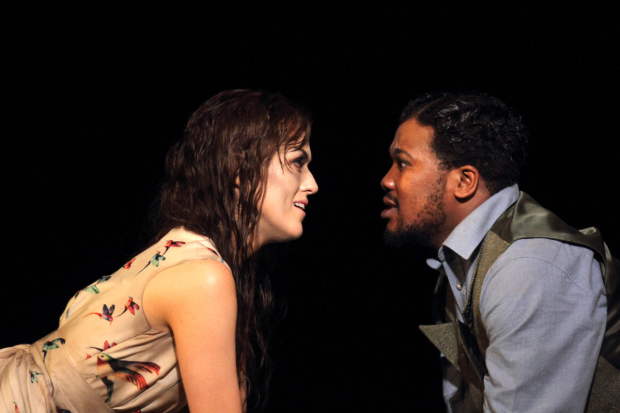Review: La traviata (London Coliseum)
ENO’s disappointing new production of Verdi’s popular crowd-puller

© Catherine Ashmore
What English National Opera needs more than anything during its convalescence from managerial malaise is goodwill. Forget the stasis of artistic caution, shrug off the security blanket of backroom number-crunching and rake in some credit with the punters. We all want ENO to become indispensable once more so that potential audiences can discover for themselves that they love it. This is something the company understands, and there has been progress of late with two fine revivals and a sterling new production (of Iolanthe) in 2018 alone.
Now up pops Daniel Kramer, in his first directorial effort since becoming the company’s artistic director, and takes a confident stride in the wrong direction.
There’s a handful of operas, the ‘core rep’, that every company wants to have up its sleeve for a rainy day. Alas, most of ENO’s keepers date from the last millennium. Only Simon McBurney’s The Magic Flute and Anthony Minghella’s Madam Butterfly are still good to go from more recent times, and at 13 years old the latter hardly counts as fresh. As for La traviata, an enduring cash cow for most opera companies, Peter Konwitschny’s one-act palimpsest appeared five years ago and was swiftly revived by former AD John Berry, but it probably doesn’t have the legs for more. Time to bring in the boss, you’d think. Which brings us back to goodwill.
Having been halibut-slapped by the sheer ugliness of Kramer’s Tristan and Isolde for the company, I assumed he’d have a point to prove and I was rooting for him. Yet if anything La traviata is even uglier. Staged in a kind of modern dress, it has little sense of overriding cohesion, so when the dying Violetta digs a grave in her bedroom it's a strong expressionistic image but aesthetically out of kilter with what’s gone before. (That list includes a coy orgy where tenor Aled Hall struts on stilettoes and licks various body parts, and a flowerbed belonging to Violetta where Germont Senior treats himself to a bunch of pick-your-own.)
'Thank goodness for the septuagenarian Alan Opie''
Kramer relishes the grotesque and is obliged by designer Lizzie Clachan who slathers on the chrome in the opera’s party scenes. La traviata, though, is a complex study of inner crises, not this camp sex fest that makes it hard to care. Costume designer Esther Bialas’s patent-leather vests and sleek satin frocks act like mirrors: they reflect emotional identification back at us just when the characters need to absorb it. Little here stirs the heart.
The ENO Orchestra played Verdi’s delicate Prelude with a rapt beauty that promised much, and notwithstanding conductor Leo McFall‘s predilection for slow tempos they delivered the goods throughout – as did the ENO choristers who were unfailingly generous of tone even when in brothel mode.
The romantic leads, Claudia Boyle as Violetta and Lukhanya Moyake as Alfredo, were oddly cast: neither has a Verdian voice and they struggled in different ways to project their characters above Kramer’s chaotics. The Irish soprano’s voice was too thin and bright for the role, her diction was imprecise and intonation tended to flatten during downward phrases. Opposite her, Moyake sounded ill at ease with a score that seemed to take a lot out of him. His running jump to one high note in Act 2 was worthy of Dick Fosbury. Thank goodness, then, for the septuagenarian Alan Opie, a little croaky perhaps but vocally forthright, textually crystal clear and dramatically committed to his character as Alfredo’s difficult dad.
Minor roles were cast from strength with notably dignified turns by Henry Waddington (Dr Grenvil) and Martha Jones (Annina), but they alone could not lift the show from its slough of despond. So here's to a better one next time, ENO. Still willing you to come good.
La traviata continues in repertoire at the London Coliseum until 13 April.












